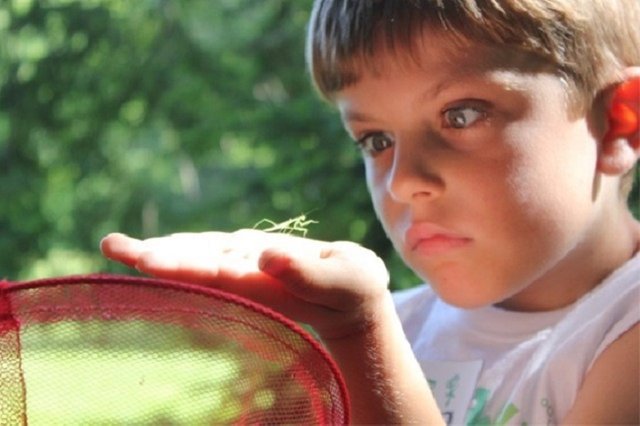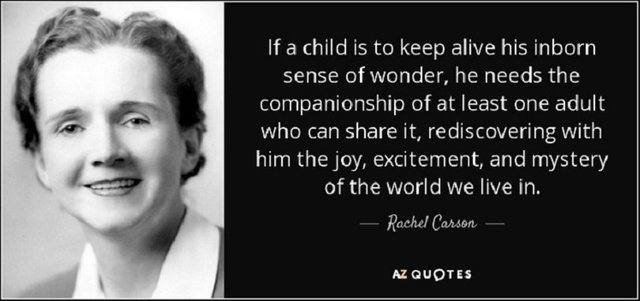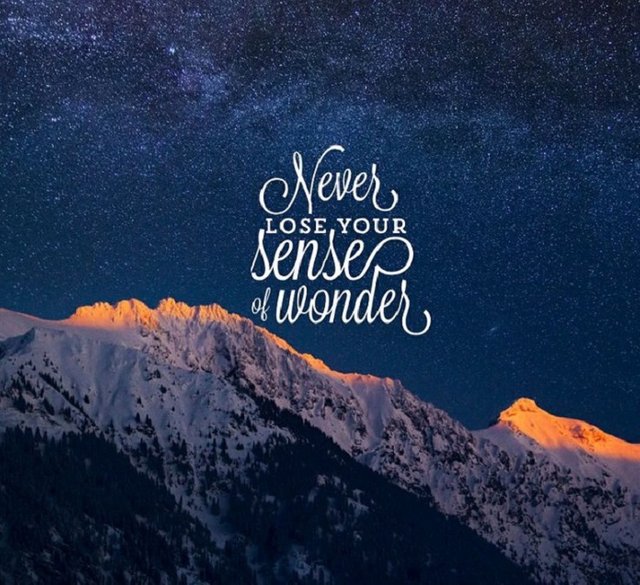[PHILOSOPHY] The Value of Wonder
"Altogether the interval is small between birth and death; and consider with how much trouble, and in company with what sort of people and in what a feeble body this interval is laboriously passed. Do not then consider life a thing of any value. For look to the immensity of time behind thee, and to the time which is before thee, another boundless space. In this infinity then what is the difference between him who lives three days and him who lives three generations?" - Marcus Aurelius, Meditations
Sometimes and suddenly the great perspectives and the intricate relationships opens up before us. We look up at the sky on a clear night and remind ourselves that the stars we see, however terribly far away they are, in a human perspective, are after all just in our cosmic 'backyard', at most a few thousand light years away.

The other day I accidentally cut myself on the finger with a kitchen knife. I saw how my skin opened up and first became white and then red when the blood started to flow, and when I got over the initial shock, I was struck with a sense of fascination and wonder at how incredibly complex and ingenious the body is, with its circulatory and nervous systems and its ability to repair itself.
The ability to marvel, together with curiosity and a vivid imagination, is perhaps the most distinctive traits of scientists. It's a skill that children seem to have more readily available than adults. In her recent and wonderfully imaginative book 'Wonder: A grammar', philosopher and religious scholar Sophia Vasalou points out that it's the child's facial expression when it discovers something new that immediately comes to mind when we want a picture of what wonder is. I could spend hours of the summer evenings lying in the grass in awe and wonder before the starry sky.
Wonder has a long history. Naturally enough, it has been understood and valued in different ways - so different that you sometimes wonder if it's the same phenomenon that has been interpreted and evaluated. Vasalou discuss a variety of historical examples that illustrate this, in everything from religion and art to science and philosophy, but a particularly illustrative and historically significant example she finds in the inception of Western philosophy. Both Plato and Aristotle considered wonder to be at the heart of the emotional life of the philosopher and researcher, so central that they regarded wonder as the very beginning and hallmark of philosophy.
While the Platonic wonder is something that philosophy aims to preserve, the Aristotelian wonder something that philosophy seeks to overcome. For Plato wonder is a state of uncertainty and almost religious awe, a condition that causes the philosopher to remain in the Socratic uncertainty and pursue the the beauty and perfection of the 'world of ideas'. For Aristotle, wonder was rather a feeling reminiscent of confusion, a feeling that occurs when we run into a phenomenon that is not understood; one realizes one's ignorance, but by examining the phenomenon the ignorance can be overcome, resulting in wonder being replaced by knowledge.

The wonder that permeates much of contemporary popular science generally, has both Aristotelian and Platonic traits. It's a kind of wonder that is directed towards this world, and not a transcendent 'world of ideas'. It mobilizes curiosity and eagerness. And it doesn't ceases with understanding, but rather deepens; it's not a passing feeling, but an abiding state. The star Betelgeuse in the constellation of Orion will relatively soon, astronomically speaking, explode and become a supernova. When I go out into the night and look at Betelgeuse this knowledge is activated, which makes the experience all the more strong.
In order to have such an experience from observing sky you need to practice, such as practicing reading, experiments, calculations etc. But in order to perform spiritual exercises, you don't have to have a degree in astrophysics. Vasalou borrows the concept of French historian of philosophy Pierre Hadot, which attracted much attention for his studies of the significance of 'the art of living' in ancient philosophy. The philosophy of the ancients, Hadot claimed, didn't primarily aim at achieving theoretical understanding of the world, but rather at personal transformation, the cultivation of oneself. To achieve this practical exercises were required, and among these the spiritual exercises were central. Vasalou discuss these exercises in a chapter on how wonder can be cultivated.
Many of the ancient schools of philosophy - Platonists, Stoics, Epicureans - used the cosmic perspective as a method of personal transformation. Human life is short, uncertain and marked by suffering, but through the spiritual exercises, one can learn to deal with this fact and achieve ataraxia, a kind of peace of mind and equanimity. To regard the world and life with cosmic eyes serves as a medicine for the soul.

We who live at the beginning of the twenty first century are in essence in the same human predicament as the ancient philosophers: it's equally important, and equally difficult for us as it was for them to learn how to live with life. But when it comes to knowledge of the universe, the situation is completely different; the details that we can fill in surpasses everything of what ancient philosophers could imagine. One can understand - or use - the knowledge, theories and perspectives as spiritual exercises to cultivate wonder.
Scales in space and time is one such an exercise tool: with the Earth and humanity deposited in successively larger contexts the mind can be overwhelmed and put into a state of wonder at the unfathomable distances and time spans of the universe. Depictions of planets and moons is another exercise tool. We're quite accustomed to Earth by now. When we read about the infernal heat of Venus, the magnificent canyons of Mars and the lakes of methane and ethane on Saturn's moon Titan, we encounter radically different places and environments that our imagination can delve into. Nucleosynthesis, the cosmic creation process by which chemical elements are formed, provides an exercise opportunity in the form of interstellar perspectives of life on Earth. Most elements heavier than hydrogen and helium are formed in stellar processes, through the fusion of the interiors of stars and the wildly violent supernova explosions. There is an ongoing cosmic cycle where stars are born, live and die, and in agony spreads their guts in space. As a byproduct planets and life are created. We are processed star ashes. If that doesn't evoke wonder, I don't know what will.
Scale exercises and the subject of stardust are of course familiar tropes in the popular scientific literature and as such risk to lose their ability to arouse wonder at mechanistic reading. But they still have the ability to arouse wonderment for the attentive reader. The first time you are met with these perspectives your consciousness is widened and spontaneous wonder arises. For the hundredth time you have to make an effort to penetrate them consciously and attentively in order to cultivate wonder. Wonder can become an approach to the world rather than only a fleeting sense.
The stoic peace of mind and the cultivated kind of wonder may seem disparate, but they have important similarities: both involve learning to see oneself, the universe and one's place in the universe with new eyes. It's about understanding how small and insignificant you are, on the whole - but not only in an intellectual sense, but also to incorporate this insight into one's whole being, transforming it into the very air you breathe and eyes you see with.
Paradoxically enough there is consolation in the indifference of the universe. The acceptance of one's own smallness and insignificance enables a deeper form of attention to the magnificence and beauty of the universe. There is a universe that is richer and more beautiful and intricately composed than you can ever imagine. The internal transformation makes one susceptible to the external beauty.

I've always tried to stress the importance of remembering to marvel at the fact that we are creatures, clinging to a spinning rock that's corkscrewing around a burning star and hurtling through space. It helps to keep the perspective balanced, and to remember to wonder :)
that's indeed an awe-inspiring perspective!
Sweet ✅❤️🆙
Thanks!
Beautifully written and very inspirational! I also remember the star gazing in my childhood. I haven't done it in years. High time to practice and work up some wonder again.
Thank you!
Will definitely check out Vasalou's book.
You must!
beautiful article @steemswede this one sententance at the end "There is a universe that is richer and more beautiful and intricately composed than you can ever imagine" makes me want to wake the children up and look at the stars with hot chocolate, telling stories of viking Gods.
haha aaw, you should definitely do that some night!